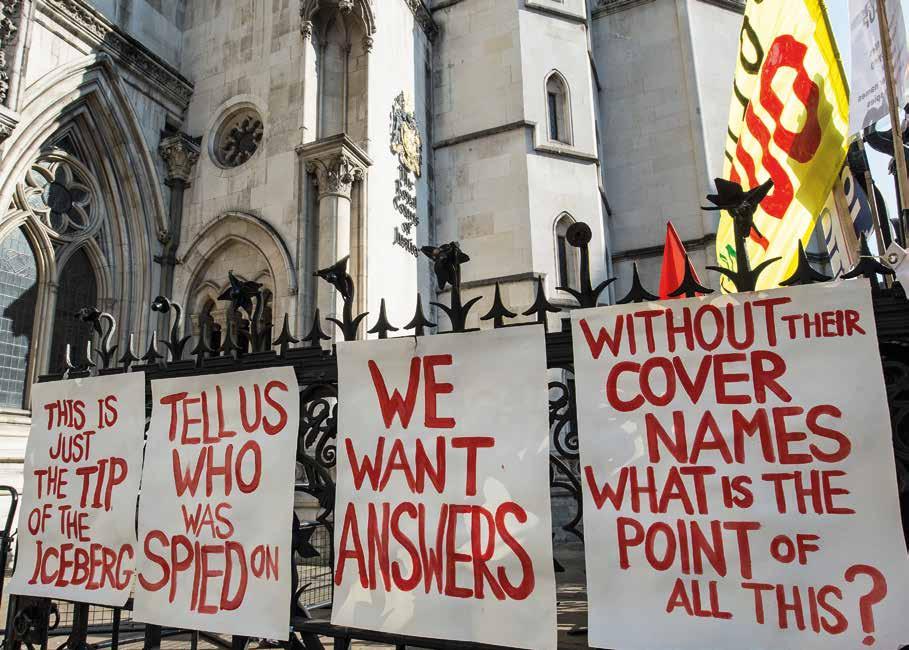
32 minute read
We stuck together to bring about change
Since 2011, disturbing revelations have come to light of police spies deceiving women into intimate relationships to spy on their legitimate campaigns. Journalists and activists have for years been calling for justice and transparency PHOTO by Guy Smallman
A LONG fought-for public inquiry into undercover policing is underway and at the same time the so-called Spy Cops Bill is being debated in Parliament.
On pages 33 and 34, historian and NEU trustee Bernard Regan explores the recent history of spying on teachers, trade unionists and justice campaigners.
While on page 35, Alison (not her real name) tells Educate why the traumatic experience of being deceived into having an intimate relationship with a police spy should concern us all.
And on page 50, Harriet Wistrich, director of the Centre for Women’s Justice, explains the importance of her successful legal battle for an apology and compensation for eight of the women who were spied on.
THE Undercover Policing Inquiry (UPI) was set up by then Conservative Prime Minister Theresa May in 2015. It was launched after revelations emerged that undercover male police officers had formed intimate personal relationships, without disclosing their real identity to the women involved.
The UPI brought new information to light about police spies’ actions that should concern all trade unionists. More than 1,000 bodies had been spied on, including many unions. In some instances, the information was passed on to employers, resulting in workers losing jobs and livelihoods.
The findings of the inquiry and any recommendations may not be presented for some years because of the amount of material to be looked at. Meanwhile, in opposition to the inquiry’s objectives, the Government is moving to pass the Covert Human Intelligence Sources (CHIS) Bill– the so-called Spy Cops Bill – which will legalise the kinds of actions under investigation.
This has implications for every trade unionist. That is why the NEU and other unions are opposed to it.
Hundreds of groups spied on
Beginning in the 1960s, undercover police units from the Special Demonstration Squad and the National Public Order Intelligence Unit spied on trade unionists, anti-racist campaigns, family groups for justice, environmental campaigners and many more.
NEU members will have heard of Blair Peach who was killed on 24 April 1979. Blair, a teacher, and friend and colleague of mine, taught in Tower Hamlets. He had been the president of the East London Teachers’ Association (ELTA), the local branch of the National Union of Teachers. He was killed in Southall while peacefully leaving a demonstration against the fascist National Front.
The only people in the vicinity of the spot where Blair was attacked were six members of a police Special Patrol Group. There has never been a full inquiry into those events. We now know that undercover police officers later spied on the campaign which was seeking the truth about Blair’s murder. sometimes passed on by school managers to local authority officers who in turn passed it to the Department for Education and Science (DES), which then took steps, in part through Her Majesty’s Inspectors (HMI), to keep a close eye on teachers.
The so-called Spy Cops Bill has implications for every trade unionist.
Campaigns seeking to discover the truth about what happened to relatives who had died in suspicious circumstances were spied on, and many of those victims were Black. The Stephen Lawrence and Colin Roach (a young Black British man who died from a gunshot wound inside the entrance of Stoke Newington police station) campaigns are two examples.
Campaigns such as the Anti-Nazi League and the Anti-Apartheid Movement were spied on. Peter Hain, now a member of the House of Lords, was a leading member of both organisations. He was spied on after he became a Member of Parliament and even when he was a Cabinet member of the Labour government.
Trade unionists blacklisted for jobs
Trade unions received special attention. For more than 30 years, building workers were the largest single group victimised, with over 3,000 names being collected and passed on to 30 or more employers such as Balfour Beatty and others, who would then refuse them employment.
Undercover police officers posing as building workers and activists in the Union of Construction, Allied Trades and Technicians (UCATT, now part of Unite) passed the names on. In 2016 the GMB union won a case against the blacklisters and a sum of £5.4 million was paid out.
Teacher union branches like the ELTA were also under surveillance during the 1970s and some came under further scrutiny from the Margaret Thatcher government in the 1980s. Information about union activity was
Teacher intimidation
Evidence of this came to light through Cabinet papers. On 19 December 1984, Sir Brian Cubbon, a Permanent Under-Secretary of State at the Home Office, wrote that the DES had been told by HMI that they were concerned about, “teacher action in Greater London”. The DES, at the request of some head teachers, decided to deploy the inspectors to these schools with the clear objective of intimidating the teachers.
However, HMI went on to say the complaints were not just about industrial action but also about teachers wanting to discuss “educational issues”. The charge against the teachers at one school was they were taking, “excessive use of teacher discussion time outside the classroom on anti-racist (and) equal opportunity issues”. HMI’s response was: “The Inspectorate hope to make shortly a full-scale inspection of one of the schools where such teachers are active.”
It’s ironic that the same government report conceded: “Some of these politically conscious teachers are known to be committed and effective in the classroom and gaining good results.” However, HMI identified the further stumbling block that teachers were not employed by the DES. Therefore teachers couldn’t be dismissed or redeployed easily in the same way as staff working in government offices.
If you can’t beat them, dismantle them
From 1981 the Thatcher government started planning to dismantle the Inner London Education Authority (ILEA). It was known for its progressive policies, having produced substantive reports on issues of equality, racism and special educational needs. The Inner London Teachers’ Authority (a branch of the NUT) worked with the ILEA on these issues.
continued on page 34
continued from page 33
In 1988 Thatcher’s civil servants were still spying on London’s teachers. By that time, however, things had changed. That year, her government passed a law that would break up the ILEA by 1990, and the ILTA too would be dismantled.
BLM and XR under threat
Trying to dictate what is taught and how did not stop with the end of the Thatcher government. It continues today.
The Department for Education guidance issued on 24 September 2020, Plan your relationships, sex and health curriculum, states: “Schools should not under any circumstances use resources produced by organisations that take extreme political stances.”
According to the Equalities Minister, Kemi Badenoch, this would include, “the anti-capitalist Black Lives Matter group”.
She said: “We should not apologise for the fact that British children primarily study the history of these islands, and it goes without saying that the recent fad to decolonise maths, decolonise engineering, decolonise the sciences that we’ve seen across our universities to make race the defining principle of what is studied is not just misguided but actively opposed to the fundamental purpose of education.”
The minister’s comments could lead to a potential ban on material from Black Lives Matter (BLM) and Extinction Rebellion (XR), and any representative from those bodies being allowed into schools. This section of the guidance is strongly opposed by the NEU. Above all, it shows a profound contempt for the professionalism of teachers to make the choices that are appropriate to the curriculum they are teaching. And today’s guidance can become tomorrow’s diktat.
The Department for Education and Science deployed inspectors to schools with the clear objective of intimidating teachers.
Bill ‘authorises covert action’
The CHIS Bill is sponsored by Home Secretary Priti Patel. She claims it strengthens human rights by bringing undercover operations under state control. She has said it will authorise covert action, “in the interests of the economic wellbeing of the UK”. But what is in the interests of the economic wellbeing of the country is a matter of debate. In my view Marcus Rashford has a better sense of what is in the interests of the wellbeing of the country than the Government.
If passed, the legislation is a licence for further anti-trade union spying and potential victimisation of those defending colleagues, children and their communities. It could be used to take actions designed to undermine the democratically determined union policies protecting members and defending education.
The Bill has been criticised by Baroness Shami Chakrabarti in the House of Lords, who said: “If this bill passes unamended, as it did in the House of Commons, I think a real Rubicon will have been crossed that we will come to regret.”
We should all be concerned about what happens next. That is why this legislation is opposed by the NEU and a range of unions including UCU, Unite, NUJ and PCS, and by the Justice4Grenfell Campaign, the Orgreave Truth and Justice Campaign and Police Spies Out of Our Lives. We should all oppose it.
Bernard Regan
Find out more…
n policespiesoutoflives.org.uk n campaignopposingpolice
surveillance.com
n spycops.co.uk The majority of officers’ cover names have been protected by the inquiry for privacy or security reasons but those we do know are available on the inquiry website with the groups infiltrated listed. Do you recognise any of these names? ucpi.org.uk/who-is-
involved/#police

Kate Wilson, who successfully took legal action, pictured outside the Royal Courts of Justice in London PHOTO by David Mirzoeff
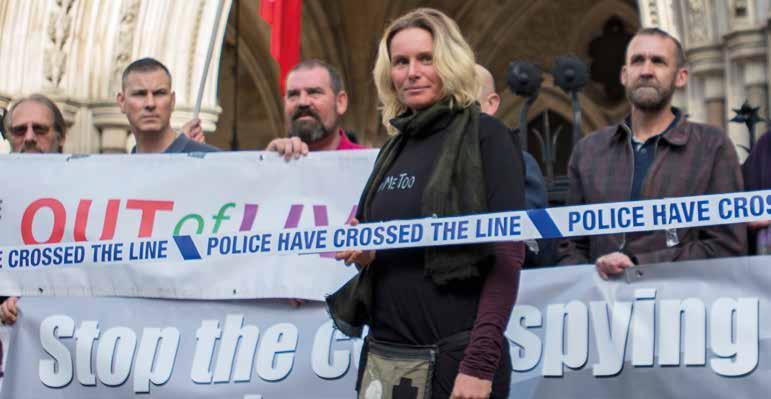

Eight women, including NUT member ‘Alison’ and Kate Wilson (pictured opposite page), successfully took legal action PHOTO by David Mirzoeff
Why we should all care about the spy cops scandal
SINCE 2011, activists have worked with lawyers and journalists to bring to public attention the shocking stories about undercover police officers spying on grieving families, stealing dead children’s identities and embarking on long-term, deceptive relationships with women like me.
Despite public interest in the human stories behind the scandal, the political significance of what has happened remains in the background. As the Undercover Policing Inquiry (UPI) moves to its second tranche of evidential hearings in April, it’s time for this to change.
During the 1990s, I worked as an English teacher in inner London and was an active member of my school and region’s union group, both of which included members of left-wing organisations. I was also a member of the Colin Roach Centre, an independent group in Hackney that had exposed police corruption and supported trade union, antifascist and anti-racist campaigns.
It was here in 1995 that I met Mark Cassidy with whom I had a five-year relationship, living together in what I believed was a monogamous relationship. I later discovered he was in fact undercover officer Mark Jenner, who was married with three children throughout our relationship.
I was involved in NUT campaigns to boycott national tests at key stage 3, to fight the education cuts, to oppose privatisation through academisation of schools and to ensure local, democratic accountability. I discussed all of this with Mark, including our unofficial strikes, and he joined me at several events and parties with my school colleagues and union friends.
State surveillance of teachers is nothing new. Blair Peach was a special needs teacher who was struck on the head during a demonstration held in April 1979 (see page 33) to prevent the National Front holding a meeting. Blair died later in hospital.
Blair Peach’s partner at the time of his death was Celia Stubbs. Celia was a member of the Colin Roach Centre when Mark Cassidy joined our group. Like many others, she has been monitored by the state for decades as she fought for a public inquiry into his death.
Not only did Special Branch officers spy on unionised teachers through the political groups they infiltrated, but Peter Francis (who later disclosed he spied on five unions, including the NUT) volunteered part-time in a special needs school using the name Pete Black. They’ve been watching us closely for years.
These deployments were aimed at disempowering the unions and derailing progressive movements. We know the reports produced by spies in the field were passed to ministers who were implementing policies impacting the lives of millions.
As a result of investigations by activists and evidence held by the public inquiry, more women are discovering they’ve been personally impacted. If you were politically active in the union from 1968 onwards, you or your colleagues might have been affected by the abusive behaviour of these officers.
This should matter to all of us who care about education. It helps us understand how we’ve reached a situation where schools are built without staff rooms, where data-driven targets are prioritised above all else and where it’s more important for a head teacher to balance a budget than support their staff and inspire their students.
Undercover political policing has been an attack on our right to protest and the foundations of our democracy.
We need the public to know about the scandal and to care about the findings of the UPI. We need you to spread the word.
Nina remembered in Palestinian schools
FORMER National Union of Teachers (NUT) president Nina Franklin, who died last summer, was a committed campaigner against injustice.
Nina was a member of the NUT and the NEU for more than 40 years. At the conclusion of her presidential address in April 2011, Nina invoked Bob Marley, to ‘get up, stand up for our rights’, calling the union to action in defence of members and in support of our international colleagues.
Nina was a leading member of Bristol NUT/NEU, and of the Palestine Solidarity Campaign, to which the NEU is affiliated. She led teacher delegations to Israeli-occupied Palestine to meet colleagues from the General Union of Palestinian Teachers and to witness first hand the effects of this illegal occupation. She was due to lead another delegation but sadly ill health intervened.
Nina’s dying wish was for Bristol NEU to set up a fund to support the education work of Hebron International Resource Network (HIRN), a voluntary organisation that has been working in occupied Palestine, with international support, since 2002. The interventions that have been made in education include the provision of funds for several school rebuilds following demolitions. Girls’ education is also high priority.
At the village of Jubbet Ad-Dib near Bethlehem the school was demolished the night before the first day of term, on 22 August 2017. Israeli human rights organisation B’Tselem said this school demolition, “epitomizes the administrative cruelty and systematic harassment by authorities designed to drive Palestinians from their land”. Israel controls ‘Area C’, covering 60 per cent of the occupied West Bank, which is home to up to 300,000 Palestinians, and severely restricts Palestinian construction and development.

Nina’s wish was to set up a fund for education in Palestine, including school rebuilds.
Online storytelling and drama for schools
THE Hands Up Project is an awardwinning UK charity, connecting young Palestinians in United Nations Relief and Works Agency (UNRWA) or Ministry of Education schools with classrooms around the world (and with our ever-expanding team of remote volunteers) for online storytelling and drama activities.
We’ve developed our own genre of theatre which we call remote theatre and run an annual competition for Palestinian children to create and perform their own short plays in English. Many of these plays are available in book format and they’re now being performed by young people all over the world.
Please email info@handsup project.org if you’d like your school to be involved or to become a volunteer.
Nick Bilbrough, founder and co-ordinator, The Hands Up Project. Visit handsupproject.org (Left) Nina Franklin (Above and below) Jubbet Ad-Dib students and their rebuilt school

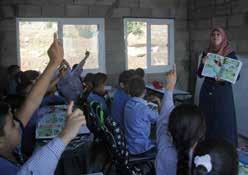

Yet five classrooms were rebuilt overnight, by around 100 volunteers, on 16 September 2017. Lessons began the following day. Part of the continuing upgrade of the school saw 42 new desks provided in November 2020 with a photo of Nina and the logo of the fund on each desk.
Several NEU districts have already made contributions to HIRN via Bristol NEU. Please donate what you can to: Nina Franklin Fund – Bristol Palestine Education Link Account number: 20431303 Sort code: 60-83-01
You can also make individual donations to the Hebron International Resource Network at friendsofhirn.wordpress.com
Visit ninafranklinfund.wordpress.com Dave Clinch, Devon NEU
Wellbeing and the call of the wild
Sarah Thompson talks to Joe Harkness, a special educational needs co-ordinator (SENCo) in Norfolk who has used his experience of mental ill health and a love of birdwatching to help students in his classroom.
JOE never expected to become a teacher. “I was really naughty at school,” he admits. “I spent a good chunk of each day in the referral unit.”
When he left school, Joe struggled to find direction, but in 2008 was offered a place on The Prince’s Trust access to youth work scheme. He discovered a “natural flair” for working with young people, which set him on “a completely back door route” into teaching.
After jobs in youth and care work, he passed his Qualified Teacher Learning and Skills status and qualified as a SENCo in 2019. Now he can’t imagine doing anything else. “I love teaching with a passion,” he says. “I don’t think there are any other jobs where you can have such a positive impact on someone’s life.
“You have to be really creative when you work with SEN kids. You need to look at the curriculum holistically, strip everything back and work out what the fundamental thing is you’re trying to achieve – a lot of the time that’s a social outcome or personal development.”
‘My SEN kids know they’re not alone’
Joe says that at the heart of creating a positive learning environment for students is his relationship with them. “I spend more time building that than anything else – you can underestimate the importance of it.
“I’m slightly eccentric, and it makes students feel more relaxed about who they are. They know they’re not alone in thinking or feeling a particular way.”
Joe is well-placed to understand some of the issues of the students he teaches. He is currently in the process of being diagnosed with attention deficit hyperactivity disorder (ADHD). And he has struggled with poor mental health for much of his life, culminating in a breakdown in 2013.
“I was in a really dark place,” he says. “I think the reality was that I was going to end up dying at my own hands if something didn’t change.”
The turning point came in the form of a pair of buzzards, which Joe spotted while out walking. He realised, watching them, that he felt relaxed and made the connection: “I’m feeling better because I’m watching the birds.”
This moment prompted the start of his recovery. “It was so much more than just seeing two birds,” Joe explains. “It was a really powerful moment. I had been trapped by my mental health for so long, and this was what I wanted to feel like.”
Joe joined the local birdwatching scene in Norfolk, made friends and found a new sense of belonging. In his 2019 book, Bird Therapy, he recounts his mental health struggles and the road to recovery. A teaching pack with activities accompanies the book. Aimed at key stage 3 and 4 students, the materials focus on mental health and wellbeing, birdwatching and nature.
Several activities begin with the simple instruction to head outside. “Learning outside of the classroom is so important,” says Joe. “It’s life experience.”
Birdwatching is possible everywhere, he insists. “Lots of people think you can only bird watch in a reserve or a wetland. That’s such a misconception.”
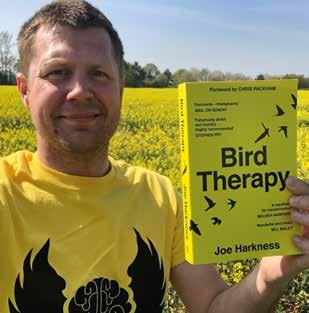
(Above) Joe with his book, Bird Therapy. (Right) With TV presenter and naturalist Chris Packham; and meeting broadcaster and natural historian Sir David Attenborough
Children in tune with their surroundings
The activities encourage children to get out into their local area. “Connecting learning to a child’s local area is so powerful,” says Joe. “Children are more in tune with their surroundings. Because they know it, because it’s part of them, it creates that stronger connection and interest.”
The activity ‘natural connections’ asks students to record the different types of habitat in their local area and what species may live there. In ‘sonic sit-space’, students close their eyes and record the sounds they hear on a sonar map sheet.
Other activities focus on mental health and provide students with the opportunity and the tools to reflect on their own wellbeing. Joe says this is vital if we are to build resilience in young people.
“The more we create these safe places to talk about these things, the more we drive down the prevalence of mental ill health, because we understand it more and can cope with it,” he says. n Joe’s teaching pack is available to download at joeharkness.co.uk n Whatever you’re going through, you can call Samaritans free at any time, from any phone, on 116 123.
Jon Biddle, English lead and NEU rep at Moorlands Primary in Norfolk, is passionate about fostering a love of reading for pleasure. Here he shares ideas and tips for schools to try.
We keep on keeping on
AS I write this, we’re a couple of weeks into the spring term and in the middle of a third lockdown. Last week, schools were given 12 hours’ notice about the fact they’d need to close to the majority of their pupils for several weeks.
Education Secretary Gavin Williamson then announced that parents could complain to Ofsted if they weren’t happy with their school’s remote learning provision. This produced a deluge of more than 10,000 emails from parents celebrating the incredible work that schools are doing.
This week, the Government has been embarrassed yet again by the appalling quality of the food packages being sent home to some of the most underprivileged families. Meanwhile, Ofsted announced it would soon be returning to inspect schools in person, before changing its mind a couple of days later.
The education system is in absolute chaos and I have literally no idea what long-term damage is going to be inflicted on schools, pupils and staff over the coming weeks.
In the midst of all this mayhem, teachers and support staff are working every hour of the day to provide their pupils with the best education possible. In some cases, they’re being asked to deliver live lessons remotely, as well as simultaneously teach the children attending school and provide support for pupils at home with limited access to technology.
It’s impossible and it’s unsustainable. But they’re doing it and I’m genuinely in awe.
Reading at home during lockdown
Encouraging children to read at home and providing support to parents to ensure that this happens remains our overriding priority at Moorlands. We’re aware that although most children are read to regularly at home, a significant number sadly aren’t, so our teachers are sharing stories and poems as frequently as possible.
We’ve encouraged children to record short videos of themselves reading a poem or story to upload to our class blogs. Many publishers and authors have recently given updated guidance about using their work online, which has made things clearer for schools.
Some pupils have given short, guided tours of their bookshelves, talking about and sharing a selection of their favourite books. This has been extremely well received by their classmates and has helped cement relationships between certain pupils when they’ve realised that other children have similar reading preferences and interests.
With book ownership and access to appropriate reading material being another obvious barrier to reading at home, we regularly share links to websites that host free stories, such as BookTrust and Oxford Owl. It doesn’t deliver the same depth of reading experience but, in the short term, it’s a perfectly acceptable substitute, with stories by well-known and well-loved children’s authors and illustrators.
The school library remains open once a week for families, and we’re continuing to send books home with food parcels.
As well as staff recommending books and sharing our own current reading on our online learning platform, we’ve also invited parents and students to contact us if they want personal recommendations for their child. This has led to positive conversations about the value of reading and assists us in building a picture of the child’s reading life outside school.
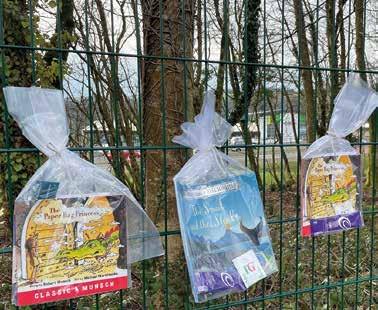
Social media is full of schools sharing fantastic ideas for developing a love of reading. This one caught my eye on the last day of half-term – Tonyrefail Community School in Wales tied 160 bags to its school fence, each containing a new book, a sachet of hot chocolate and a bookmark for children and their families to take. @CaraMarvelley
Read more ideas from Jon next issue
The joys of reading a book together
Several children have indicated that one of the things they miss most about being in class is having the opportunity to listen to a story together and, on a personal level, I completely agree. Reading aloud is one of the most rewarding aspects of teaching and perhaps the most special time of the day for a class.
While none of the above suggestions replace the joy of reading a book together, recreate the feelings of anticipation and excitement whenever you end on a cliffhanger or take the place of the passionate discussions that regularly occur about the characters in a story, they do still help reinforce the message that reading is important and fun.
I know we’re all fervently hoping that life returns to something resembling normality in the near future but, in the meantime, stay safe and try to focus on what’s important.
Just getting through each day is enough for now and, even though some of us are facing increasingly unrealistic expectations from the top, we don’t need to place ourselves under any more pressure. @jonnybid
Let us know if you’d like to review them – email us at educate@neu.org.uk
Before Windrush
THE Windrush Lessons Learned Review, commissioned by the Home Secretary and published in March 2020, called for a learning and development programme for Home Office staff to learn about Britain’s colonial past and the history of Black Britons.
The report recognises that the history of Black people in Britain did not start with Windrush. This book, Before Windrush: West Indians in Britain, helps us all with understanding that Black people helped build modern Britain over many centuries. There were approximately 10,000 Black people in Britain in the 1700s, for example.
Using a series of themes and examples of activists, this book – written by a former NUT and a current NEU member – highlights Black pioneers in sport, activism, health and literature. Insights into Black leaders who organised against racism reveal an untold story of Black activism, and their actions were all the more remarkable because of the brutal penalties they faced for challenging the status quo.
I particularly like that Black women are featured – for example, Amy Ashwood Garvey, who organised against racism in the 1930s, and Una Marson, who became a leading Black feminist. The authors remind us that there is much we can learn from earlier struggles to organise against racism – and how much we owe campaigners.
I would like to have seen more about education and educators, trade union organising and about Asian and African unity. Maybe the next volume… or maybe NEU Black members could write it.
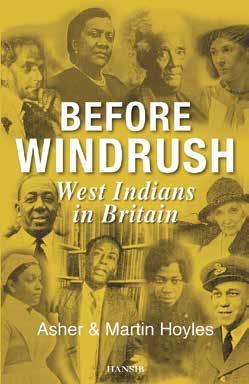
Karen Chouhan, NEU lead officer, equality and social justice Before Windrush: West Indians in Britain by Asher and Martin Hoyles. Hansib Publications. £9.99.
Talking Consent
TALKING Consent sensitively tackles important issues regarding relationships and sex education.
The book features 16 dynamic workshops to empower young people and provide them with the opportunity to discuss a wide range of topics, including social and antisocial media, gender expectations, resilience, selfesteem and body image.
Each section includes a variety of engaging lesson ideas and facts for educators, as well as case studies and video clip links for students to reflect upon. Downloadable resources are also provided. An informative handbook suitable for key stages 3 and 4.
Cindy Shanks Talking Consent: 16 Workshops on Relationships and Sex Education for Schools and Other Youth Settings, by Thalia Wallis and Pete Wallis. Jessica Kingsley Publishers. £26.99.
Soda Pop
WRITTEN by one of Sweden’s most influential authors, Barbro Lindgren’s Soda Pop is a classic novel for children aged seven and above.
In this anarchic story, Soda Pop loves bright orange clothes and wears a tea cosy on his head. Grandfather Dartanyong leaves his woodshed every morning with a new identity and great-grandfather lives in a tree and thinks he is a cuckoo.
With wonderful illustrations, this first English edition is sure to be loved by UK readers as much as it is loved in Sweden.
Aliss Langridge Soda Pop, by Barbro Lindgren, illustrated by Lisen Adbåge. Gecko Press. £7.99.
The Afterwards
EMBER and Ness are inseparable friends until Ness tragically dies. Unsure how to cope, Ember is tricked into visiting Ness in the Afterworld, where the dead live in a black-and-white world. A F Harrold’s rich descriptions and Emily Gravett’s beautiful illustrations sensitively explore grief, guilt, loneliness, sadness and friendship. A poignant read for key stage 2 and up.
Cindy Shanks The Afterwards, by A F Harrold, illustrated by Emily Gravett. Bloomsbury. £7.99.
Be Kind
WITH 125 practical ideas beautifully presented, this book aims to make a positive impact on the people and places around you. From simple actions like taking a friend’s tray to clear up after lunch, to bigger projects such as writing thank you notes to emergency services workers, this is a great resource for a class project.
Elli Rhode Be Kind: You can make the world a happier place! by Naomi Shulman, illustrated by Hsinping Pan. Storey Publishing. £7.99.
Diverse modern books for children
IN the last issue of Educate, Jane Hailstone asked for modern books featuring Asian figures (Educate, January/February, page 40).
Eyes that Kiss in the Corners (right) by Joanna Ho is a beautiful modern book all about a young Asian girl.
May I also suggest that Jane follows @theconsciouskid
@hereweeread @diversereads
and @littleblackbooknook (all pictured below) on Instagram, which do a fantastic job of sharing diverse books for children. Sasha Tamblyn, Plymouth
Remote teaching and so much more
YEARS ago, when I was teaching in the comprehensive school of a small market town, the BBC decided to film a scene there. They wanted a group of children and my year 9 form was chosen.
I remember being surprised just how many people the BBC sent to make one short scene. I joked with colleagues about how it took ten people three hours to shoot a scene of a few minutes, whereas we had just a few minutes to prepare three hours of lessons.
Remote learning has taken demands on teachers to a new level. Under pressure from parents and management, we are now filming our own lessons while simultaneously teaching a live class. We have to be researcher, creative director, broadcast and sound engineer, camera operator, wardrobe supervisor, make-up artist (these last two are important – we are judged) and producer, all rolled into one.
All of this while directing the activities and ensuring the safety of a class, in a cold room with all the windows open, for up to six-and-a-half hours a day.
And did I mention being the actor as well? Please forgive me if I forget to press the record button. Jane Godfrey, Hereford
Donne’s ‘poem’ that’s not actually a poem
Interview Feature
Interview by Max Watson Portraits by David Levene/ Guardian/eyevine
IT is always good to receive
22
my copy of Educate and a real pleasure to read the article about Michael Rosen (above) for whose recovery and fighting spirit we give thanks (Educate, January/ February, page 22).
But I’m sure that Michael knows that For Whom the Bell Tolls is not a poem. I see that some websites say it is, and set it out in persuasive free verse, but it is part of a meditation on sickness by John Donne, written in prose.
Teacher’s petFrank
Frank, a beautiful Romanian rescue dog, is the pet of Wendy Halling, a retired teacher from Bedfordshire. Wendy says: “He is a cheeky monkey and makes me laugh every day. “He’s a registered therapy dog and takes part in the Read2Dogs scheme at Orchard Park Community Primary and Cotton End Forest School – his favourite story is Hairy Maclary. “He qualified for Crufts last year, after winning the Scruffs heat on Countryfile, and enjoyed a television appearance with Clare Balding.”

If you have a treasured pet you’d like to show off, email a high-resolution photo with 50 words about what makes them so special to educate@neu.org.uk
Donne wrote much poetry, but typically in strict metres and rhymes. His prose is never more memorable than this extract, but he’d be surprised to have it deemed a poem. John Arthur, France
Prime Minister’s words taken out of context?
MICHAEL Rosen (Educate, January/February, page 22) says: “Johnson’s own phrase was ‘let it rip’. That’s to say, if you let the infection rip, some people will die, few people will get seriously ill, but almost everybody else would get immunity.”
I’ve tried and failed to find any source of the quotation used in this way by the Prime Minister. He has used the phrase “let it rip”, but to oppose the idea, at a Downing Street press conference on 12 October. I hold no brief for Boris Johnson, but that’s not the point. I suggest you publish a correction. Gill Wrobel, London
Michael Rosen and the editor write: True, Johnson later used the phrase ‘let it rip’ when renouncing the strategy of herd immunity without vaccination. Yet in March 2020, that clearly was the Government’s plan.
Journalist Robert Peston described this strategy of deliberately letting the virus spread on 12 March in The Spectator magazine under the headline: Herd immunity will be vital to stopping coronavirus.
He didn’t mention the inevitable huge loss of life.
A day later, Government scientist Graham Medley explained on BBC’s Newsnight: “We are going to have to generate what we call herd immunity… the only way of developing that, in the absence of a vaccine, is for the majority of the population to become infected.”
Government Chief Scientific Adviser Sir Patrick Vallance and epidemiologist Professor John Edmunds both advocated the herd immunity strategy in the absence of a vaccine.
At the time, Boris Johnson was appearing on TV telling us that he was shaking hands with Covid patients.
They did indeed plan to let it rip, but you’re right – they later denied this.
Please writeThe editor welcomes your letters but reserves the right to edit them.
Email your letters to: educate@neu.org.uk Please note we cannot print letters sent in without a name and postal address (or NEU membership number), although we can withhold details from publication if you wish.
Covid vaccine to help keep schools open
I’D be interested to know views on the Covid vaccine being offered to teachers. The NEU has said we are the beating heart of communities, therefore shouldn’t we be given the vaccine as a priority in order to keep schools open? Vicky Revill, Staffordshire (and several others posing the same question)
n See page 7 for latest news
We must listen to pupils
WE need to be garnering the voice of our students. I am a supply teacher with 22 years’ experience. I ask students how they are feeling about being in school. They see how exhausted and stressed their teachers are. They are taught by supply teachers about 30 per cent of the time, sometimes more.
Students know what their schools are doing for them but feel let down by a system that is not getting ahead of the virus. Moreover, they feel terrible they are contributing to making things worse. They do all they can to be safe, but they don’t always practice social distancing at school because they can’t.
The recent effectiveness of youth environmental activism has highlighted how informed, perceptive and intelligent our young people are. Please find a way to allow them to raise their voices and be heard.
Star letter Planning, shopping, cooking on curriculum
I READ with interest the letter from Andrew Mckay (Educate, January/February, page 40). As a teacher of food preparation and nutrition, I agree it is a life skill.
In recent years, food teaching has moved away from design and technology with a focus on teaching basic skills and developing a good understanding of where our food comes from.
We need to go a step further and equip pupils with the knowledge of how to plan weekly meals and shop for food to prevent the huge amounts of food wastage. Pupils need to know how to buy only the ingredients they need, as well as how to use the information on food packaging to ensure food is used within date. TV programmes such as the BBC’s Eat Well for Less? have started to address these matters, but these skills should be part of the curriculum.
It’s great to see copies of the Jack Monroe cookbooks being given as prizes in Educate magazine. I have used some of the recipes from Tin Can Cook with sixth form pupils in life skills lessons and find the recipes ideal for university students’ budgets and provide the nutrition required for growing teens. Michaela Ryan, Manchester
n See page 47
Imogen Shaw, Oxford
Updateyour membership details – visit my.neu.org.uk
KEEPING your membership information up to date is vital to ensure you get the most from your NEU membership.
You may be eligible for reduced subscriptions – for example, if you work part-time, are about to take maternity leave or retire.
Have you moved? Tell us your new home or workplace address.
Have you answered the equality monitoring questions? Information you give will be strictly confidential and help us to target relevant information on campaigns and events.
Thousands of members are already using myNEU, the online portal that enables you to manage your NEU membership.
To register and activate your login, visit my.neu.org.uk
For more information about the additional benefits that come with your NEU membership, visit neu.org.uk/
neu-rewards











